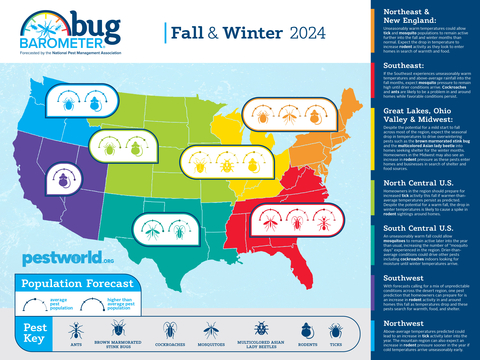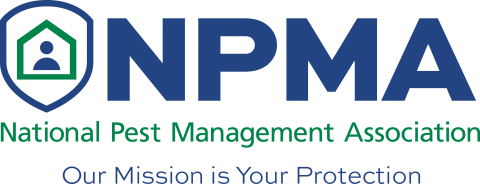Pest Pressure Warning: Experts Predict Surge in Pests Across the U.S. This Fall & Winter
Pest Pressure Warning: Experts Predict Surge in Pests Across the U.S. This Fall & Winter
The National Pest Management Association reveals Fall & Winter 2024 Bug Barometer® forecast for the continental U.S.
FAIRFAX, Va.--(BUSINESS WIRE)--Today, the National Pest Management Association (NPMA) released its bi-annual Bug Barometer®, forecasting what Americans can expect from pest populations in their respective regions across the U.S. this fall and winter based on weather patterns, long-term forecasts and pest biology. With warmer-than-normal temperatures expected to continue, NPMA’s pest experts are anticipating tick and mosquito populations will remain active through the fall season. However, temperature drops will result in a spike in rodent issues at the start of winter as these pests flock to homes and businesses in search of warmth and food sources.
“When it comes to pests, even the slightest fluctuations in temperature and precipitation can have a significant impact on their populations and activity,” said Dr. Jim Fredericks, Senior Vice President of Public Affairs at NPMA. “A warm and wet fall, for example, can allow disease-carrying pests like ticks and mosquitoes to remain active and breeding much longer than we’d typically expect and just a few cold nights can result in a significant uptick in rodent sightings in homes.”
Based on their analysis, NPMA’s Fall & Winter 2024 Bug Barometer® is forecasting an increase in pest pressure across the U.S.:
Northeast & New England
Unseasonably warm temperatures could allow tick and mosquito populations to remain active further into the fall and winter months than normal. Expect the drop in temperature to increase rodent activity as they look to enter homes in search of warmth and food.
Southeast
If the Southeast experiences unseasonably warm temperatures and above-average rainfall into the fall months, expect mosquito pressure to remain high until drier conditions arrive. Cockroaches and ants are likely to be a problem in and around homes while favorable conditions persist.
Great Lakes, Ohio Valley & Midwest
Despite the potential for a mild start to fall across most of the region, expect the seasonal drop in temperatures to drive overwintering pests such as the brown marmorated stink bug and the multicolored Asian lady beetle into homes seeking shelter for the winter months. Homeowners in the Midwest may also see an increase in rodent pressure as these pests enter homes and businesses in search of shelter and food sources.
North Central U.S.
Homeowners in the region should prepare for increased tick activity this fall if warmer-than-average temperatures persist as predicted. Despite the potential for a warm fall, the drop in winter temperatures is likely to cause a spike in rodent sightings around homes.
South Central U.S.
An unseasonably warm fall could allow mosquitoes to remain active later into the year than usual, increasing the number of "mosquito days" experienced in the region. Drier-than-average conditions could drive other pests including cockroaches indoors looking for moisture until winter temperatures arrive.
Southwest U.S.
With forecasts calling for a mix of unpredictable conditions across the desert region, one pest prediction that homeowners can prepare for is an increase in rodent activity in and around homes this fall as temperatures drop and these pests search for warmth, food, and shelter.
Northwest U.S.
Above-average temperatures predicted could lead to an increase in tick activity later into the year. The mountain region can also expect an increase in rodent pressure sooner in the year if cold temperatures arrive unseasonably early.
To help prevent pest problems this fall and winter, the experts at NPMA recommend keeping kitchens clean, storing food in airtight containers, and lifting boxes off the floor to avoid creating hiding spots for pests. Homeowners should also seal any cracks and holes on the exterior of the home, repair torn screens, and eliminate standing water or overgrown grass around their property.
“While prevention measures are key to keeping your home protected, a seasonal inspection with a trained pest control professional can help identify areas of your home that may be more susceptible to pest issues. If an infestation does arise, they can help you identify the pest problem and develop a course of treatment,” said Fredericks.
For more information about pest prevention, NPMA’s Bug Barometer® forecast, and to find a pest control professional near you, visit PestWorld.org.
About the National Pest Management Association
The NPMA, a non-profit organization with more than 5,500 members, was established in 1933 to support the pest management industry's commitment to the protection of public health, food and property from the diseases and dangers of pests. For more information, visit PestWorld.org or follow @PestWorld on Facebook, X, Pinterest, TikTok and YouTube and @PestWorldOfficial on Instagram.
Contacts
Brianna Greco
Vault Communications, Inc.
bgreco@vaultcommunications.com
(610) 329-0442

